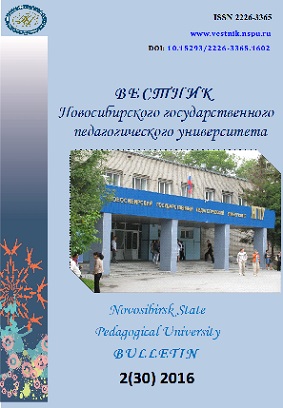Прагматика новых обозначений и самообозначений
в современном педагогическом дискурсе
Pragmatics of new nominations and self-nominations in modern pedagogical discourse
Author(s): Marina Aleksandrovna LappoSubject(s): Philology
Published by: Новосибирский государственный педагогический университет
Keywords: Pedagogical discourse; loanword; semantics; structure of meaning; pragmatic macrocomponent of meaning; ideological component of meaning; evaluative connotations; spontaneous lexicography
Summary/Abstract: The article describes recent trends of lexical transformations in the texts of modern teach-ers, namely, the emergence of various kinds of neologisms: new names for teacher or mentor; new names for kinds and methods of teaching; transliteration names; composites; metaphorical transformations and extensions of lexical compatibility. The reasons for the introduction of for-eign language vocabulary into the pedagogical discourse are under analysis. For example, the author confirms the widely discussed fact of intervention of market discourse into Russian-speaking educational discourse. Foreign discourses yield similar examples. There is a phenom-enon of "spontaneous lexicography" in the types of texts that previously had not been used for that aim (in curricula and programs of scientific conferences). Newspeak and defining of neolo-gisms without indication of the author are presented as tools of the "power of discourse" in the understanding of M. Foucault, T. van Dijk. The author develops the ideas of the integrated theory of lexical meaning and a number of studies on the structure of the pragmatic macrocomponent (Yu. D. Apresyan, G. N. Sklyarevskaya, V. N. Teliya, E. Yu. Bulygina, T. A. Tripolskaya, etc.).The author applies the techniques of contextual analysis on the material of neologisms in contemporary pedagogical discourse.It allows establishing the structure of the pragmatic component.It is proved that the ideological and evaluative components of the macrocomponent are integrated in the semantic structure of neologisms. In its turn, the ideological microcomponent includes components of la-belling new ideas, the transmission of an ideal image of the new pedagogy and the idea of the "the other" in it. The evaluative component includes a positive assessment, the growing prestige of new teaching professions and technologies.
Journal: Вестник Новосибирского государственного педагогического университета
- Issue Year: 6/2016
- Issue No: 2
- Page Range: 124-137
- Page Count: 14
- Language: Russian

